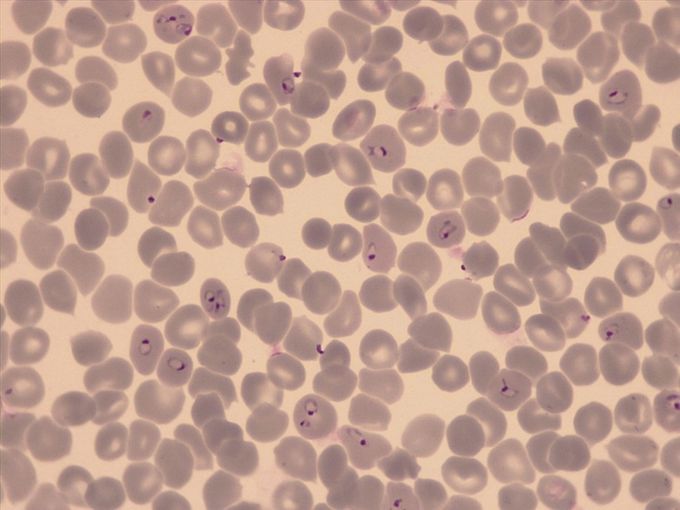Bacterial pathogens becoming resistant to antibiotics is well known. But resistance is also emerging among parasites — including those that cause malaria. As existing medicines lose effectiveness, researchers from Swiss TPH and the Helmholtz Institute for Pharmaceutical Research Saarland (HIPS) and partners have developed a new drug candidate that can kill malaria parasites even when standard treatments fail. The findings were published in Angewandte Chemie.

Red blood cells infected with Plasmodium falciparum (Photo credit: Armin Passecker)
Each year, more than 260 million people are infected with Plasmodium falciparum, the parasite responsible for malaria. Although case numbers in Europe remain low, they are expected to rise as climate change expands the habitat of malaria-transmitting mosquitoes.
Despite effective artemisinin-based therapies being available since the 1990s, malaria still causes around 600,000 deaths annually — driven by limited access to medicines and growing drug resistance. New compounds that act through novel mechanisms are urgently needed.
To address this, Swiss TPH and the Helmholtz Institute for Pharmaceutical Research Saarland (HIPS) with partners BASF and OmicScoutshave developed a new drug candidate that can kill malaria parasites even when standard treatments fail.
By screening more than 100,000 molecules from BASF’s compound library, researchers identified a promising molecule — compound 31. The initial goal was to find substances that target the enzyme IspD, involved in parasite metabolism.
“After identifying several promising molecules, we systematically modified their chemical structures to improve their properties,” said Patricia Bravo, Postdoctoral Scientific Collaborator at Swiss TPH and first co-author of the study. “With compound 31, we discovered a candidate with excellent drug-like properties that efficiently kills Plasmodium falciparum.”
To understand how compound 31 works, the team treated parasites with small doses of the compound and analysed resulting genetic changes. “By applying selective pressure, we can observe which mutations occur and infer how the compound acts or how the parasite adapts to survive,” said Matthias Rottmann, project leader at Swiss TPH. Proteomic analysis showed that compound 31 blocks the parasite’s ability to produce new proteins — a process essential for its survival.
Because compound 31 acts through a completely new biological mechanism, it has the potential to overcome existing resistance and open the door to new therapeutic strategies. Laboratory tests show no toxicity to human cells. The research team will now further investigate the molecule with the aim of developing it into a next-generation antimalarial therapy.
Contact

Patricia Bravo
Postdoctoral Scientific Collaborator I
+41612848834
patricia.bravo@swisstph.ch